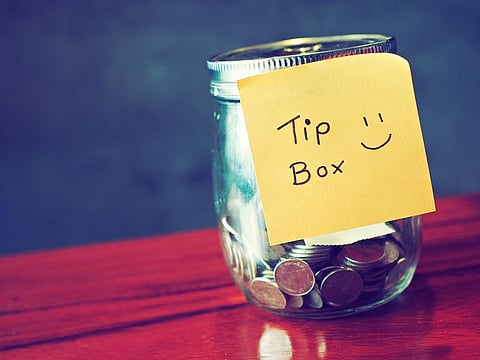How much should you tip service providers in the UAE?
What is the acceptable amount to pay waiting staff, drivers, bellhops?

Also In This Package
Dubai: If you had an online purchase delivered to your home or just got off the taxi after reaching your destination, do you find yourself reaching for your wallet but are unsure on how much you should pay as tip to the person who has just delivered a service?
The culture of tipping – whether or not you should tip, and how much is appropriate – varies across the world. This culture becomes even more complex in countries like the UAE, which are home to various nationalities. So, what is the best approach to take when it comes to expressing your appreciation through a tip for the service industry professionals? Gulf News spoke to experts in the UAE service industry to find out what the industry standards are and how UAE residents choose to tip.
What is the industry standard?
According to Mohamed Jaseem, Director of Asset Management at Ròya International, a hospitality consultancy firm, there is no set percentage of the bill amount which is used as an industry standard. However, tips can vary from nothing at all to around 15 per cent of the bills.
“UAE is a melting pot of various nationalities and culture and as expected in such diverse populations, there is no common practice in UAE. The general trend, however, is to give some tip,” Jaseem said.
Ten per cent is obviously an easy rate to calculate – it just feels like a fair range for both the customer and the server. Having a range allows the customer to show appreciation for receiving good service.

While ‘no tips’ may be a restaurant practice in a handful of restaurants, it is also acceptable to not leave any tip at times, and according to Jaseem, restaurant staff would not necessarily be offended, unlike other countries, like the US. However, most customers in the UAE appear to prefer leaving a tip of approximately 10 to 15 per cent of the bill amount. Why 10 per cent? According to Jaseem, it could just be because it makes the math easy.
“Ten per cent is obviously an easy rate to calculate – it just feels like a fair range for both the customer and the server. Having a range allows the customer to show appreciation for receiving good service,” Jaseem said.
Why do we give tips?
The practice of tipping is said to have originated in 18th-century English pubs where customers would attach coins to notes to the waiter ‘To Insure Promptness’ (T.I.P.), according to a 1984 research paper by Michael Lynn, who is a professor of consumer behaviour and marketing at the Cornell University School of Hotel Administration. Over the centuries, the practice of tipping has expanded to most customer-facing jobs, with musicians, bellboys, porters, doormen and hair stylists receiving tips. However, even in the US, which has a dominant culture of tipping, the reasons for tipping can vary from it being a gesture to supplement service personnel’s incomes, to appreciation of good service, or to even ensure good service in the future.
What is the common practice in the UAE?
This understanding, that people prefer to give a tip which is easier to calculate, seems to be corroborated by a 2017 survey by ServiceMarket, a UAE-based home services marketplace, in which half the respondents said that they did not like doing the math to get a percentage of the bill. Many said that they simply chose to pay the same amount of money as a tip to cleaners, drivers and delivery boys.
During COVID-19, this tipping culture appears to have persisted in the UAE, according to Bana Shomali, founder of ServiceMarket.
“UAE residents have always been generous tippers, with close to 50 per cent of residents stating that they tip service staff all or most of the time. In the pandemic, with home services going on hold during the movement restrictions, many of our customers were even more generous with tips to support technicians and cleaners. Since the opening up of the UAE economy, home services companies have now fully resumed operations and tipping is back to its normal levels,” Shomali said.
Another factor that affects the amount or calculation of tips is which service the customer is receiving. So, if you are using a taxi or have just received a home delivery, you may choose to give a Dh5 or Dh10 tip. However, at a restaurant, you may prefer calculating a certain amount of the total bill. This is how most Dubai residents tip, according to the ServiceMarket survey:
Restaurant staff
The customary amount is between 10 and 15 percent of the bill. Some places keep a tip jar on the counter. If that’s the case, then you don’t need to hand out money directly to the person serving you and can just drop some money in the jar.
Since the opening up of the UAE economy, home services companies have now fully resumed operations and tipping is back to its normal levels.

Taxi drivers
Many Dubai residents said that they choose to give tips to taxi drivers. You can either give Dh5 or Dh10 to the driver, or just let them keep the change.
Hairstylists and spa staff
You can either tip Dh5 or 10 per cent of the bill, whichever is more.
Supermarket staff
Many people choose to ask one of the staff members at the supermarket to help them pack and bring the groceries to their car. Small change should suffice.
Delivery drivers
There is often a small fee for delivery of items to your home. But if you don’t want the drivers to fumble through their pockets to look for change and want to show appreciation for their service, you can round it up to the nearest currency note and let them keep the change.
Home services staff
It is also customary to give a tip of Dh5 to Dh20 to staff that provide home services in Dubai such as cleaning, maintenance, moving and painting.
Valets, bellhops, and housekeeping staff
In Dubai, the standard tip for valet service, bellhops and hotel maids is between Dh5 and Dh10 per night of stay. You can make the tip more substantial if you are carrying lots of heavy luggage. Some people also leave a tip in their hotel room for housekeeping staff.
Sign up for the Daily Briefing
Get the latest news and updates straight to your inbox








